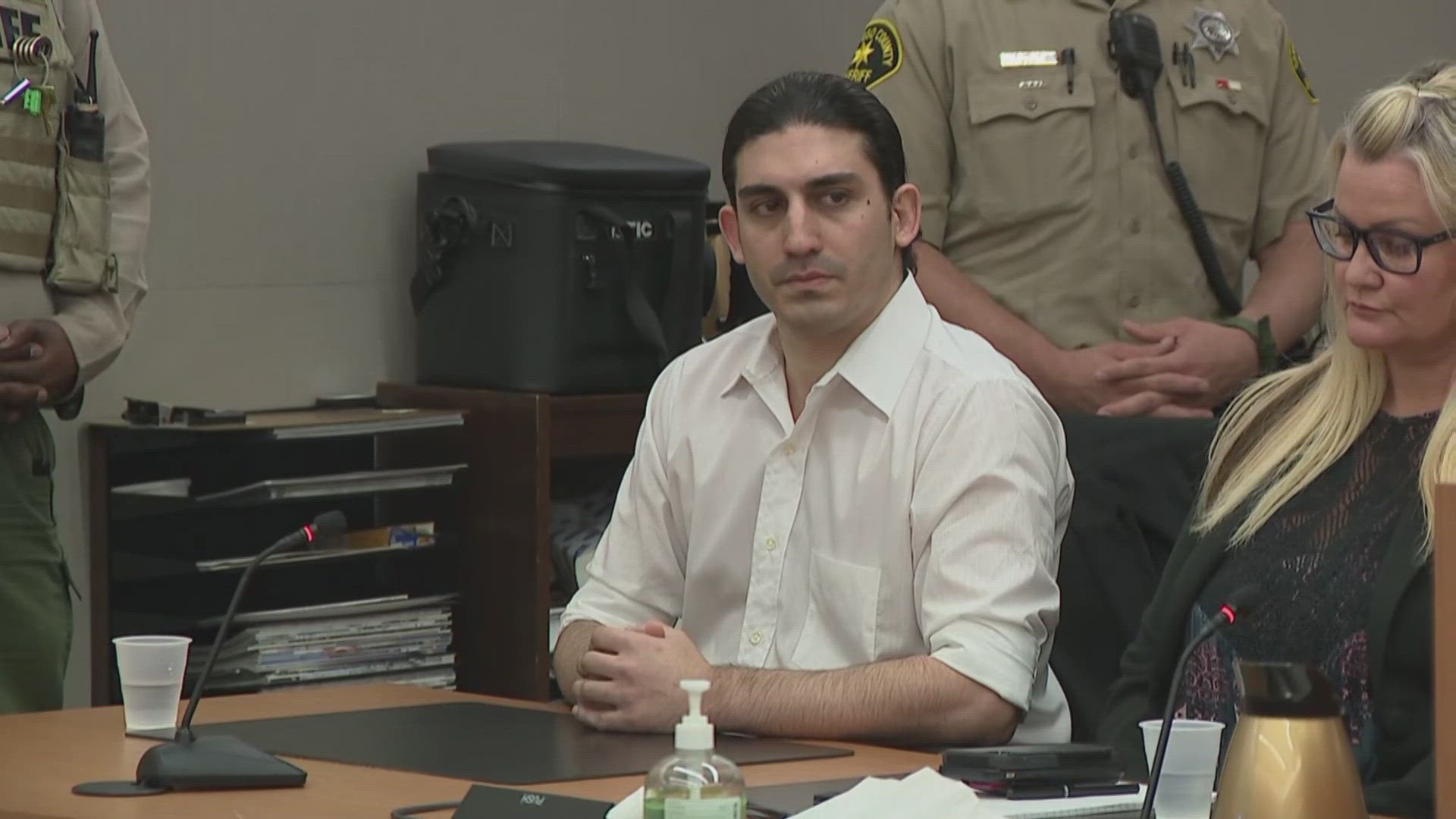Ali Abulaban: TikTok Star Jinnkid's Murder Trial & Life In Prison | Latest
Could a viral sensation, celebrated for bringing laughter to millions, truly be capable of committing a heinous crime? The case of Ali Abulaban, the former TikTok star known as "Jinnkid," who was convicted of murdering his estranged wife and her friend in San Diego, reveals a chilling juxtaposition of online fame and real-world tragedy.
The tragic events unfolded in October 2021, casting a long shadow over Abulaban's once-vibrant online persona. The 32-year-old, who had cultivated a significant following on TikTok and other social media platforms, was found guilty of the first-degree murders of his estranged wife, Ana Abulaban, 28, and her friend, Rayburn Cardenas Barron, 29. The killings took place at an East Village apartment in San Diego. Abulaban, known online as "Jinnkid," had built a following of fans with his comedic impersonations and content creation.
| Category | Details |
|---|---|
| Full Name | Ali Nasser Abulaban |
| Online Alias | Jinnkid |
| Date of Birth | Approx. 1990 (Age 32 at time of conviction) |
| Location of Incident | San Diego, California |
| Victims | Ana Abulaban (Estranged Wife), Rayburn Cardenas Barron (Friend of Ana Abulaban) |
| Crime | First-Degree Murder |
| Sentencing | Life in prison without the possibility of parole |
| Marital Status | Separated/Estranged (Married to Ana Abulaban) |
| Military Service | Served in the U.S. Air Force |
| Known For | TikTok content creation, comedic impersonations |
| Date of Incident | October 21, 2021 |
| Court | San Diego Superior Court |
| Reference | NBC San Diego |
The courtroom drama was punctuated by the conflicting narratives of the prosecution and the defense. The prosecution painted a picture of a man consumed by jealousy and rage, while the defense attempted to portray Abulaban as someone who acted in the heat of passion, overwhelmed by the discovery of his wifes alleged infidelity. Opening statements were delivered on a Wednesday in the murder trial. Defense witnesses began taking the stand as the trial progressed.
- Chef Ben Ford Son Of Harrison Ford Culinary Star Life Career
- Where Is Famous In Power Book Iii Antonio Ortizs Fate
The prosecutions case hinged on the undeniable evidence: Abulaban's own confession, the physical evidence at the scene, and the damning details of the events leading up to the murders. Abulaban confessed to the crime, admitting that he had shot and killed his wife and her friend. He testified that he "snapped" after seeing them together. Evidence presented included photos of the bodies sent by Abulaban to family and friends, moments after the slayings.
The motive, according to the prosecution, was Abulaban's growing obsession with his wife's actions and his suspicions of her alleged extramarital affair. He had reportedly been monitoring her activities, including listening to her conversations on his daughter's iPad. Furthermore, he had moved his family, including his wife and daughter, to San Diego hoping to further his content creation career, which was rapidly growing on TikTok. However, as his fame grew, the marriage began to deteriorate.
The defense, however, sought to mitigate the severity of the charges by claiming that the killings were not premeditated, but rather a result of Abulaban's emotional distress. He argued that he acted in the heat of passion, overwhelmed by the discovery of his wifes relationship with another man. While Abulaban never denied pulling the trigger, he contended that his actions were not part of a pre-planned scheme.
- Discover Senora May Kentuckys Rising Star Her Music
- Sophia Leones Death Cause Revealed After Months Of Investigation
The couple's history, as revealed during the trial, painted a complex picture of their relationship. Ali and Ana Abulaban had met in 2014 while both were serving in the Air Force and stationed in Okinawa, Japan. Their life together included periods of apparent happiness, marked by the birth of their daughter, but also frequent disputes and separations. By 2020, Ana had separated from Ali's father, Nasser Abulaban, with whom she had been in a relationship. This period of instability appeared to contribute to the growing tensions between Ali and Ana. Shortly afterward, Ali and Ana also moved to San Diego as the formers career as an online personality grew thanks to his virality over TikTok.
The jury ultimately sided with the prosecution. The verdict, delivered in a San Diego Superior Court, found Abulaban guilty of first-degree murder. The sentence: life in prison without the possibility of parole. The courtroom was filled with emotion as the verdict was read, with some members of the crowd reportedly clapping and cheering upon hearing that Abulaban would "die in prison."
Abulaban's reaction to the verdict was one of defiance. He has since claimed that the trial was unfair and that the verdict was based on media bias. He maintains his argument that the killings were not premeditated, and thus, the sentence of life without parole is unjust.
The case has generated significant interest and debate. The juxtaposition of Abulaban's online persona, which was built on humor and lighthearted content, with the gravity of his crimes has captured the attention of the public and the media. The rapid ascent of his online career, beginning around 2019, and his subsequent fall from grace have been widely documented. In 2020, as his online popularity grew, so did the cracks in his marriage. This case serves as a sobering reminder of the complex interplay between online fame, personal relationships, and the potential for tragic outcomes. Abulaban, who went by "jinnkid" on social media, saw his online fame come to an abrupt end, replaced by the harsh realities of the criminal justice system.
The murder trial involved the playback of trial video footage, including a confession from Ali Abulaban to his mother moments after the slayings. Testimony and evidence presented during the trial painted a picture of a marriage strained by infidelity and jealousy. Before the tragic events, the couples interactions were frequently documented on social media, creating a facade of a perfect life. However, behind this facade, the couple was deeply troubled.
Emily Palmer, a senior crime writer at People, covered the story extensively, providing detailed insights into the investigation, the trial, and the broader context of the case. Her reporting, along with that of other journalists, helped to inform the public about the intricacies of the case and the complexities of the human emotions involved.
The sentencing, which occurred on a Friday, brought the case to a close, at least in the legal sense. But the story of Ali Abulaban continues to resonate, prompting reflection on the nature of online celebrity, the fragility of relationships, and the devastating consequences of violence.
The impact of the trial was felt across the community. The victims' families were left to grapple with the loss of their loved ones. Those who had known Ali Abulaban were left struggling to reconcile the image of the entertainer they knew with the reality of his crime. The case serves as a cautionary tale of how quickly life can change, and how even the most successful of public figures can become entangled in the complexities of human conflict.
The case has raised crucial questions about the role of social media in society. The content that people create and consume can sometimes blur the lines between reality and fiction. The case of Ali Abulaban, where his online presence was so integral to his identity, highlights the complex relationship between public image and private life, particularly in the digital age. San Diego, the location of the crime, was left to mourn the loss of its citizens. The city's East Village, the site of the crime, was also a space of grief.
The legacy of Ali Abulaban, the TikTok star turned convicted murderer, will continue to be a subject of intense debate. While he may have sought to entertain and bring joy to millions, his actions have resulted in sorrow. His story serves as a reminder that behind every public persona, there are complex human beings with the capacity for both good and evil.
Article Recommendations
- Sophia Leones Death Cause Revealed After Months Of Investigation
- Discover Chris Sails Bio Net Worth Queen Drama



Detail Author:
- Name : Mrs. Winnifred Yundt
- Username : gerda.krajcik
- Email : jamel82@crist.com
- Birthdate : 2001-10-26
- Address : 9339 Marshall Fields Balistreritown, ME 76667
- Phone : 1-380-646-4819
- Company : Herman, Schaefer and Tillman
- Job : Upholsterer
- Bio : Odio tenetur tempore quod quia dolor voluptate repellat quos. Odit rerum sunt ducimus odio. Ea dolor quo aliquam aliquam autem officia quos qui. Enim perspiciatis eius non rem.
Socials
tiktok:
- url : https://tiktok.com/@upton2025
- username : upton2025
- bio : Voluptates molestias illum et voluptas odio ut. Quia facere neque nihil dicta.
- followers : 3885
- following : 1932
facebook:
- url : https://facebook.com/reinaupton
- username : reinaupton
- bio : Consequatur reprehenderit velit eos pariatur explicabo veniam aut accusamus.
- followers : 1019
- following : 2162
linkedin:
- url : https://linkedin.com/in/reina_dev
- username : reina_dev
- bio : Cupiditate non doloremque ipsum eligendi et.
- followers : 4176
- following : 1768
twitter:
- url : https://twitter.com/uptonr
- username : uptonr
- bio : Et voluptatem voluptatibus aut occaecati esse veniam expedita sunt. Occaecati quia sunt eligendi ipsum occaecati.
- followers : 6043
- following : 37